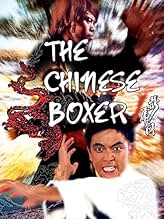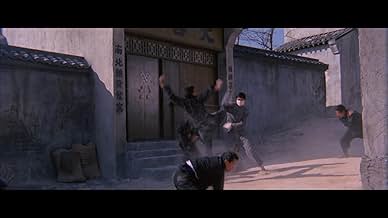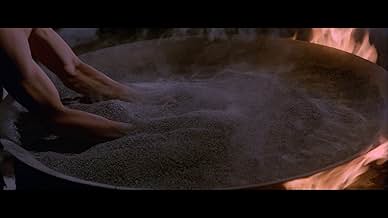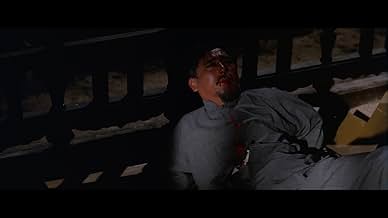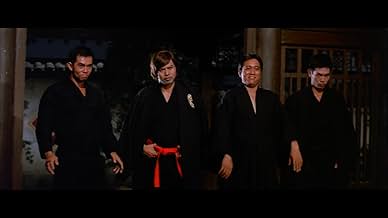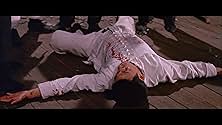AVALIAÇÃO DA IMDb
6,8/10
1 mil
SUA AVALIAÇÃO
Um grupo de lutadores japoneses massacram uma escola de artes marciais chinesa e um dos alunos consegue escapar. Escondido, ele aprende uma nova técnica de luta e volta para se vingar dos ja... Ler tudoUm grupo de lutadores japoneses massacram uma escola de artes marciais chinesa e um dos alunos consegue escapar. Escondido, ele aprende uma nova técnica de luta e volta para se vingar dos japoneses, em uma série de duelos.Um grupo de lutadores japoneses massacram uma escola de artes marciais chinesa e um dos alunos consegue escapar. Escondido, ele aprende uma nova técnica de luta e volta para se vingar dos japoneses, em uma série de duelos.
- Direção
- Roteirista
- Artistas
Jimmy Wang Yu
- Lei Ming
- (as Yu Wang)
Lung Yu
- Greeting student
- (as Yu Chung Chieh)
Avaliações em destaque
Saw this as HAMMER OF GOD @ Loew's DELANCEY with Mario Bava's HATCHET FOR THE HONEYMOON-- -one of the *best* twin-bills I ever saw and I saw hundreds from the mid-1950s till the *end of the double-bill*, as a movie-going fact-of-life, mid-late 1970s.
The DELANCEY was a huge old "movie palace"-style theater, with humongous screen, super sound system, balcony, full-service concession stand in a big-BIG lobby, *the works*.
The big screen is absolutely *vital* to the peak enjoyment of the rich color, speed-of-light action of HAMMER.
The impact of HATCHET on a small home screen must be terribly attenuated, the atmosphere sharply reduced, surely.
BOTH these films were made with *big screens* in mind. The film-makers of that bygone era could not have foreseen today's cracker-box 'plex "theaters" (*hawk-ptooi*) which generally seat >500, in malls built in the ever-popular Birkenau style of architecture.
I'm High Church about the big-theater films of that era ---I simply won't see them again: My *memory* serves me well enough.
It is simply too depressing, too degrading to see the scratched and pitted prints with their bleached-out "colors" and raggedy soundtracks on a tiny home screen.
I wouldn't accept THE LAST SUPPER or LA PRIMAVERA as thumbnails, and that's what watching vintage movies of happy memory is to me today.
Cheers !
The DELANCEY was a huge old "movie palace"-style theater, with humongous screen, super sound system, balcony, full-service concession stand in a big-BIG lobby, *the works*.
The big screen is absolutely *vital* to the peak enjoyment of the rich color, speed-of-light action of HAMMER.
The impact of HATCHET on a small home screen must be terribly attenuated, the atmosphere sharply reduced, surely.
BOTH these films were made with *big screens* in mind. The film-makers of that bygone era could not have foreseen today's cracker-box 'plex "theaters" (*hawk-ptooi*) which generally seat >500, in malls built in the ever-popular Birkenau style of architecture.
I'm High Church about the big-theater films of that era ---I simply won't see them again: My *memory* serves me well enough.
It is simply too depressing, too degrading to see the scratched and pitted prints with their bleached-out "colors" and raggedy soundtracks on a tiny home screen.
I wouldn't accept THE LAST SUPPER or LA PRIMAVERA as thumbnails, and that's what watching vintage movies of happy memory is to me today.
Cheers !
The most important fact about this movie: A Shaw Brothers movie written by, directed by, and starring Jimmy Wang Yu. That was the first and last time that ever happened.
It starts on a busy street in a small Chinese town. I think Shaw Brothers was just showing off that they could put together a throw away scene with hundreds of extras wandering a complete small town. So it really starts when our villain enters a kung fu school and criticizes them. He is a former student, kicked out for violence, and now a student of Japanese martial arts. Challenge accepted! He fights them but his moves do not resemble karate. During the opening credits one student runs, it seems to be about ten miles, to notify the master. He arrives first at a rock quarry where Jimmy Wang Yu and Cheng Lui seem to be working like slaves. They rush back to the school. Karate guy is now using judo. After introductions and rudeness the teacher arrives. They fight and teacher draws first blood. Karate/Judo guy vows to return with karate experts.
Cut to Jimmy Wang Yu walking and talking with his girl. She predicts a bad ending to all this karate versus kung fu business. Back at the school the master bores everyone with a lecture on the history of martial arts. Two important points are- the Chinese take credit as the originators of all martial arts and the Iron Palm and Light Leaping techniques can defeat karate. Remember that, there will be a one question test at the end of the movie. "How do you defeat karate?"
What follows is then the first training sequence. Jimmy engaged in many exercises to show the physical demands required to gain martial arts proficiency. In reality this is a redundant and mind numbing process so the movies had to make it look more interesting.
Lo Lieh plays an absolute bad guy in this movie. He is one of the few leading men who had real martial arts experience before he started acting. His career began with hero roles but subsequently turned to villains. He is probably better remembered as a villain. His background was in karate so was a perfect fit for this role. Chan Sing is another villain in this movie. He also has a background in Goju-Ryu karate. I am unable to verify of this is before, after, or during his acting career. He fights Jimmy at about 30 minutes into the movie and most of the fight choreography is actually karate for the first time in this movie. He takes out Jimmy with a hit to the forehead.
This movie has my highest recommendation which is underwhelming because it is a landmark film that had social and cultural influence beyond the movie world and is mandatory viewing for any fan of this genre.
It starts on a busy street in a small Chinese town. I think Shaw Brothers was just showing off that they could put together a throw away scene with hundreds of extras wandering a complete small town. So it really starts when our villain enters a kung fu school and criticizes them. He is a former student, kicked out for violence, and now a student of Japanese martial arts. Challenge accepted! He fights them but his moves do not resemble karate. During the opening credits one student runs, it seems to be about ten miles, to notify the master. He arrives first at a rock quarry where Jimmy Wang Yu and Cheng Lui seem to be working like slaves. They rush back to the school. Karate guy is now using judo. After introductions and rudeness the teacher arrives. They fight and teacher draws first blood. Karate/Judo guy vows to return with karate experts.
Cut to Jimmy Wang Yu walking and talking with his girl. She predicts a bad ending to all this karate versus kung fu business. Back at the school the master bores everyone with a lecture on the history of martial arts. Two important points are- the Chinese take credit as the originators of all martial arts and the Iron Palm and Light Leaping techniques can defeat karate. Remember that, there will be a one question test at the end of the movie. "How do you defeat karate?"
What follows is then the first training sequence. Jimmy engaged in many exercises to show the physical demands required to gain martial arts proficiency. In reality this is a redundant and mind numbing process so the movies had to make it look more interesting.
Lo Lieh plays an absolute bad guy in this movie. He is one of the few leading men who had real martial arts experience before he started acting. His career began with hero roles but subsequently turned to villains. He is probably better remembered as a villain. His background was in karate so was a perfect fit for this role. Chan Sing is another villain in this movie. He also has a background in Goju-Ryu karate. I am unable to verify of this is before, after, or during his acting career. He fights Jimmy at about 30 minutes into the movie and most of the fight choreography is actually karate for the first time in this movie. He takes out Jimmy with a hit to the forehead.
This movie has my highest recommendation which is underwhelming because it is a landmark film that had social and cultural influence beyond the movie world and is mandatory viewing for any fan of this genre.
In the last few months, I've become reacquainted with Jimmy Wang-Yu, whose movies I hadn't seen since Friday nights at the drive in back in the 70's. An authentic Asian superstar, Wang-Yu's movies usually have a simple plot familiar to any chop-socky fan. What sets him apart is that he had an appreciation of fighting styles from other countries that really liven up the fight scenes. (A great example of this is the movie "The Chinese Professionals".) This movie is one of the few to explain why karate fighters had an easy time with kung fu students but would always fall to the masters. If you're looking for a representative kung fu movie, this is the one. The plot is a template for most every kung fu flick that came after. Not as spectacular as his later films, but the climactic battle with Lo Lieh (star of another classic, "Five Fingers of Death") is well worth the price of the movie. Recommended.
The Chinese Boxer is typical of Chinese propaganda about the Japanese. Chinese boxing is for sport, Karate is for killing, and boy do they kill. Eye gouging and rape in an action-packed fist-fest. A chinese man returns to challenge the kung fu master who threw him out of town with his new found Judo skills. His defeat leads to calling on Japanese Karate experts, and on it goes from there. Our hero's entire school is wiped out, leaving him to seek revenge by learning new techniques.... you get the idea. The town becomes an excuse for the local gambling den. The final fight seen involves some nice sword play. An ok flick, could have done without the rape scene, which isn't too explicit, but still...
The late, great Jimmy Wang Yu wrote, directed, and starred in this martial arts classic with an appreciably simple, straightforward story. A swaggering heel named Diao Erh-yeh (Hsiung Chao) comes to a school of Chinese boxing to throw his weight around. But the wise teacher (Mien Fang) sends him packing. Soon, the villain has returned with brutal karate fighters from Japan, and they slaughter almost everybody in the school. But our hero survives, and spends time recuperating and training for what he knows is going to be a tough quest for revenge.
This viewer would agree that "The Chinese Boxer" only gets better as it goes along. The fighting is top-notch, of course, and the film has a definite energy and flow to it. It's also quite amusingly violent, with a lot of bright red movie blood oozing from various mortal wounds. Our hero, Lei Ming, is a calm, steady, soft-spoken type, and the villains are absolutely classic in their unsubtle nastiness. (To add insult to injury, Diao Erh-yeh takes over the whole town, turning it into a hotbed of corruption.) Best of all is when the climactic action is taken outside, and our opponents start tangling in the snowy wilderness. But the training scenes are also as cool as can be, as Lei Ming learns to practice "weightlessness" and creates "hands of iron". Interestingly, in this saga, karate is portrayed in a largely negative way, with the teacher explaining the difference between karate and Chinese boxing to his students.
The music is good, the widescreen photography excellent, and the cast solid; this viewer did watch the English-language version, but the dubbing really didn't bother him that much. Overall, this is quite engaging, and clearly influenced later films such as Quentin Tarantinos' "Kill Bill" saga.
Eight out of 10.
This viewer would agree that "The Chinese Boxer" only gets better as it goes along. The fighting is top-notch, of course, and the film has a definite energy and flow to it. It's also quite amusingly violent, with a lot of bright red movie blood oozing from various mortal wounds. Our hero, Lei Ming, is a calm, steady, soft-spoken type, and the villains are absolutely classic in their unsubtle nastiness. (To add insult to injury, Diao Erh-yeh takes over the whole town, turning it into a hotbed of corruption.) Best of all is when the climactic action is taken outside, and our opponents start tangling in the snowy wilderness. But the training scenes are also as cool as can be, as Lei Ming learns to practice "weightlessness" and creates "hands of iron". Interestingly, in this saga, karate is portrayed in a largely negative way, with the teacher explaining the difference between karate and Chinese boxing to his students.
The music is good, the widescreen photography excellent, and the cast solid; this viewer did watch the English-language version, but the dubbing really didn't bother him that much. Overall, this is quite engaging, and clearly influenced later films such as Quentin Tarantinos' "Kill Bill" saga.
Eight out of 10.
Você sabia?
- CuriosidadesThis is the first chinese martial arts movie where they dont fight with swords but rather with hands
- Versões alternativasUK video versions were cut by 1 min 3 secs by the BBFC to edit lethal body blows and to heavily reduce the rape scene.
- ConexõesFeatured in Trailer Trauma Part 4: Television Trauma (2017)
Principais escolhas
Faça login para avaliar e ver a lista de recomendações personalizadas
- How long is The Hammer of God?Fornecido pela Alexa
Detalhes
- Tempo de duração1 hora 27 minutos
- Mixagem de som
- Proporção
- 2.35 : 1
Contribua para esta página
Sugerir uma alteração ou adicionar conteúdo ausente

Principal brecha
By what name was A Morte em Minhas Mãos (1970) officially released in India in English?
Responda
